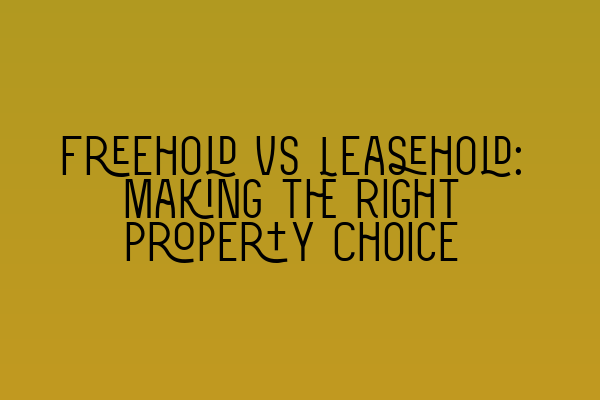Freehold vs Leasehold: Making the Right Property Choice
When it comes to buying a property, one of the most important decisions you will make is whether to go for a freehold or leasehold. Understanding the differences between these two types of property ownership is crucial in making the right choice that suits your needs and financial circumstances. In this blog post, we will explore the key aspects of freehold and leasehold properties, helping you navigate through this important decision.
What is Freehold?
Let’s start by understanding what freehold means. Simply put, when you own a freehold property, you have complete ownership of the property and the land it sits on. This means that you are not subject to any time restrictions or obligations to another party. You have full control over the property and can make decisions regarding any modifications or alterations without seeking permission from anyone else.
Owning a freehold property provides you with the ultimate form of ownership rights. You have the freedom to use the property as you wish, whether it’s residential or commercial. Additionally, freehold properties tend to be more attractive to potential buyers as they offer a sense of security and long-term investment value.
If you are considering buying a freehold property, it’s important to note that you will be responsible for the maintenance and repair of the property. While this may incur additional costs, you have the flexibility to manage these matters on your own terms.
What is Leasehold?
Leasehold, on the other hand, is a different form of property ownership. When you purchase a leasehold property, you are essentially buying the rights to occupy the property for a specified period of time, as outlined in the lease agreement. The land on which the property is built is typically owned by a freeholder, who grants you the lease.
Leasehold properties often come with certain obligations and restrictions. For example, you may need to pay ground rent to the freeholder, as specified in the lease agreement. Additionally, you will need to seek permission from the freeholder for any significant modifications or alterations to the property. Leaseholders may also have to contribute towards service charges for the maintenance and upkeep of communal areas if the property is part of a larger development or has shared spaces.
It’s important to carefully review the terms of the lease agreement before purchasing a leasehold property. The length of the lease, ground rent, service charges, and any other obligations should be thoroughly understood before making a decision.
Which Option is Right for You?
Deciding between a freehold and leasehold property depends on various factors, including your personal preferences, lifestyle, and financial situation. Here are a few points to consider when making your decision:
Long-term Investment
If you’re looking for a long-term investment, freehold properties are generally considered to be a better option. They tend to hold their value well over time, and you have the freedom to sell or pass on the property as you wish. Leasehold properties, on the other hand, may have diminishing value as the lease term decreases.
Flexibility and Control
Freehold properties offer the advantage of complete control and freedom when it comes to managing your property. If you value the ability to make changes to the property without seeking permission from anyone else, freehold might be the right choice for you.
On the other hand, if you prefer not to be solely responsible for the maintenance and repair of the property, leasehold properties may be more suitable. The maintenance and upkeep of common areas are often taken care of by the freeholder or a management company, which can be a relief for some homeowners.
Cost Considerations
When it comes to cost, freehold properties may initially be more expensive than leasehold properties. However, leasehold properties often come with additional costs such as ground rent, service charges, and potential renewal or extension fees. It’s essential to carefully consider the long-term financial implications of both options before making a decision.
Conclusion
Choosing between a freehold and leasehold property is a significant decision that should not be taken lightly. By understanding the differences between the two and considering your personal circumstances, you can make an informed choice that suits your needs and financial situation. Whether you opt for the complete control of freehold ownership or the convenience of leasehold, it’s essential to seek professional advice and review all legal documents thoroughly before proceeding with your property purchase.
To further support your SQE exam preparations, consider exploring our related articles:
